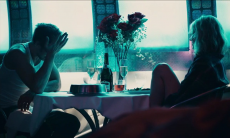
Email: reecejordan98@hotmail.co.uk
Total Article : 168
About Me:18-year-old sixth form student, studying English Literature, History and Government and Politics. My articles will broadly cover topics from the current affairs of politics to reviews of books and albums, as well as adding my own creative pieces, whether it be short fiction or general opinion.

Restrain yourself, starry-eyed and rouge-cheeked youth. Your dreams of Mr. Gosling are but such; dispel them. Such artificiality should not entice you to a film, and such expectation will suffer a miserable death. The prescriptive fairy-tale love story is not evident here. Though, indeed you will find harmony and tenderness in its portrayal of young love, the crux of the film lies in its oscillating fashion between the past and the present, the blooming and decaying stages of love.
Blue Valentine is a film that revolves around the relationship of Dean (played by Ryan Gosling) and Cindy (played by Michelle Williams). Both actors deserve praise for their stunning portrayal of their respective characters, and so they should. Derek Cianfrance, the film’s director, conditioned the two into formulating a real relationship-based chemistry by forcing them to live together. Such active participation has reaped its rewards; both Michelle Williams and Ryan Gosling have achieved the nomination of best actor and actress in such ceremonies as Satellite Awards and the Academy Awards.
The film begins with the family dog escaping its cage and eventually getting run over. “How many times did I tell you to lock the f**king cage?” Dean moans as Cindy weeps into her hands. This is the main premise of the film. Dean, a devout romanticist has exuded his charm and excited the naïve Cindy in what seems as a transitory moment of lust. The constant switch between past and present shows Dean’s perpetuation of an infantile premise of love; that as long as he is with the woman of his dreams, his life is fulfilled (“I get to return you [Cindy] and Frankie everyday, this is the dream!”), whereas Cindy, whilst conscious of the unconditional love oozing out of Dean in the beginning stages, her life soon begins to orbit around her adeptness at her profession, something which she pines for Dean to strive for (“you have so much potential; you can sing, you can draw, you can dance”/ “Why do you have to make money off of your potential, potential for what?”. It is within the fututre room, a poignant portrayal of love gone lost, that we see that whilst Dean may dwell within the domain of domestic civility and protection, Cindy finds solace in pragmatism and the work she provides for her family and daughter.
The film finishes not on a climax, though Cindy and Dean’s verbal battle may be presumed as such, but rather on the cliff-hanger of presumption. Is Cindy and Dean’s marriage over even after the sacrificial vow of marriage? Has Dean accepted his fate as an unconditional romantic, that such idealism is not compatible in a world that necessitates pragmatism? Is blood thicker than water, as questioned in Frankie’s desperate break from her mother’s clutch towards Dean’s leg? It is within such questions that Blue Valentine triumphs amongst its vague appraisal; it is a film that prides itself upon the questioning of relationships, and the way in which we respond to such difficulty.
Image Creidts: themoviegoer.com

0 Comment:
Be the first one to comment on this article.